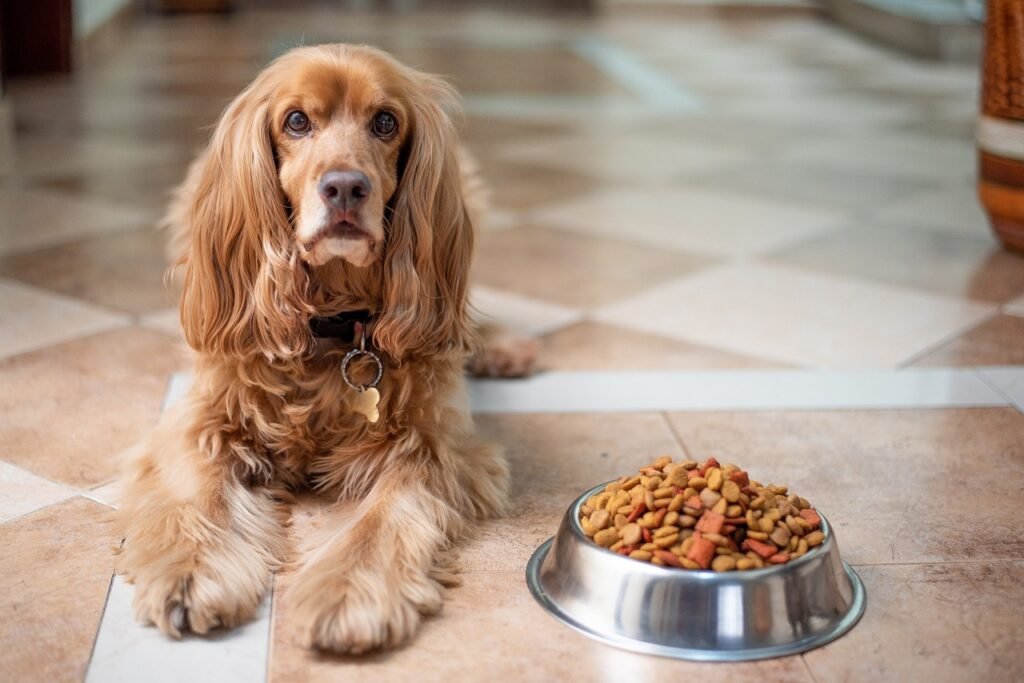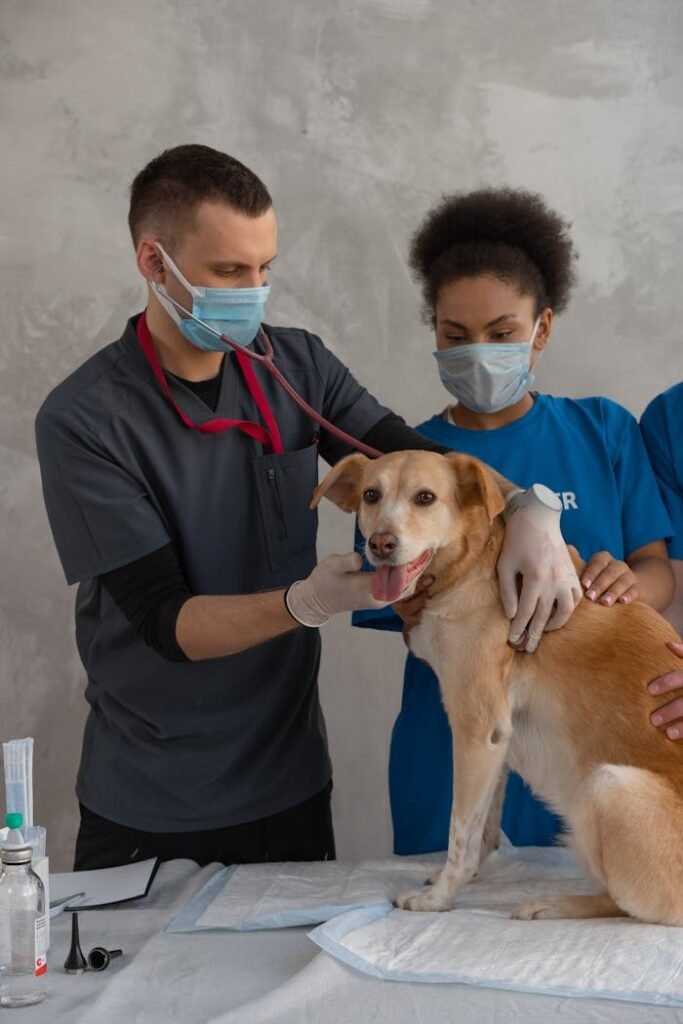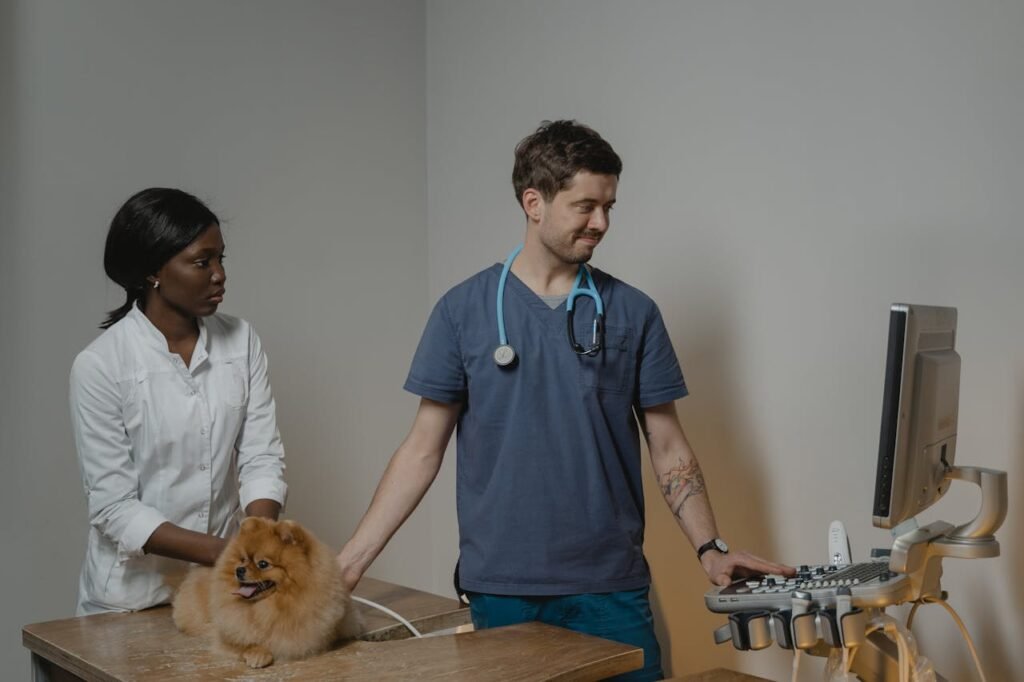How to care for your senior dog’s health through proper diet, exercise, and management of common age-related issues.
As dogs age, their health needs change significantly. Providing them with the right care, including adjusting their diet, maintaining a safe exercise routine, and managing health issues, is essential to ensure your senior dog’s happiness and comfort. Let’s explore the key tips for caring for senior dogs, helping them thrive in their golden years.
1. Adjusting the Diet for Senior Dogs

Aging dogs benefit from foods that support their changing needs. Senior dog foods are designed to be lower in calories but higher in fiber and contain nutrients that promote joint health and digestion.
What Should Senior Dogs Eat?
- Lower calories: This helps prevent obesity, which can strain their joints. Look for food with fewer calories but still packed with nutrients to maintain a healthy weight.
- High-quality protein: Ensure your dog’s food contains lean proteins like chicken, fish, or turkey. Protein is critical for muscle mass maintenance, which is especially important as dogs become less active.
- Joint supplements: Many senior foods include glucosamine and chondroitin to support aging joints. These supplements help with mobility and reduce inflammation in the joints.
What to Avoid in Senior Dog Diets
High-fat or high-calorie foods should be minimized to avoid weight gain, which can lead to mobility issues and other health concerns such as diabetes and heart disease. Table scraps or unhealthy treats should also be limited.
Meal Frequency
Some senior dogs’ benefit from eating smaller, more frequent meals to help with digestion and maintain energy levels. Always consult your vet for specific dietary advice based on your dog’s health and weight.
2. Tailoring Exercise for Senior Dogs

Regular exercise is crucial for senior dogs to maintain their mobility, prevent obesity, and keep their minds active. However, it’s important to adjust the intensity and duration of exercise to suit their physical capabilities.
Best Exercises for Senior Dogs
- Short, frequent walks: Break up long walks into shorter, more manageable outings. A 10-minute walk twice a day can help keep them active without causing strain.
- Swimming: This is an excellent low-impact exercise that’s easy on joints. If your dog enjoys the water, swimming can help strengthen muscles without the stress of weight-bearing exercises.
- Puzzle toys and mental stimulation: Keeping your senior dog’s brain active is just as important as physical exercise. Puzzle toys, food-dispensing games, or interactive training can help sharpen their cognitive function.
Signs of Overexertion
Watch for signs that your dog may be overdoing it. If they start limping, show stiffness, or pant heavily after exercise, it may be time to scale back or consult your vet.
3. Managing Common Health Issues in Senior Dogs

As dogs age, health issues like arthritis, dental disease, and cognitive decline become more common. Managing these conditions proactively can greatly improve your dog’s quality of life.
Arthritis and Joint Pain
Arthritis is one of the most common issues affecting senior dogs, especially larger breeds. Signs include limping, stiffness, and difficulty getting up after resting.
- Supplements: Omega-3 fatty acids, glucosamine, and chondroitin are often recommended to support joint health. These can reduce inflammation and improve mobility.
- Comfortable bedding: Orthopedic beds with memory foam help relieve pressure on sore joints, ensuring your dog can rest comfortably.
- Medications: Your vet may prescribe non-steroidal anti-inflammatory drugs (NSAIDs) to help manage pain and inflammation in severe cases.
Dental Health
Dental problems, such as gum disease and tooth decay, are common in older dogs and can lead to pain, infection, and even systemic health issues if left untreated.
- Regular brushing: Brushing your dog’s teeth daily with a dog-safe toothpaste can help prevent plaque buildup and gum disease.
- Dental chews: Offer dental chews approved by your vet to help maintain oral health.
- Vet check-ups: Regular dental exams and professional cleanings are crucial to prevent more serious issues.
Cognitive Decline
Canine cognitive dysfunction, similar to dementia in humans, can affect older dogs. Signs include disorientation, anxiety, and changes in sleep patterns.
- Routine: Maintaining a consistent daily routine can help reduce anxiety in dogs experiencing cognitive decline.
- Supplements: Certain supplements, such as SAM-e, antioxidants, and Omega-3 fatty acids, have been shown to support cognitive health.
- Mental stimulation: Keep your dog engaged with toys, scent games, and light training to maintain brain activity.
4. Preventive Care and Regular Vet Visits

Routine vet visits are vital for catching any age-related issues early. Senior dogs should visit the vet at least twice a year for wellness exams, blood work, and screenings to monitor their overall health.
- Blood tests: Regular blood work helps detect underlying conditions like kidney or liver disease before they progress.
- Vaccinations and parasite control: Senior dogs may have weaker immune systems, so staying on top of vaccinations and parasite control is essential.
- Weight monitoring: Unexplained weight changes can signal an underlying health problem, such as thyroid disease or diabetes. Keep track of your dog’s weight at home and consult your vet if you notice significant changes.
5. Creating a Safe and Comfortable Environment

As your dog ages, it’s important to adapt their living environment to suit their changing mobility and comfort needs.
- Ramps and non-slip surfaces: If your dog struggles with stairs or jumping onto furniture, install ramps or provide non-slip mats to make movement easier.
- Comfortable sleeping areas: Orthopedic dog beds or heated blankets can help alleviate joint pain and provide a comfortable place to rest.
- Accessibility: Ensure food and water bowls are within easy reach, especially if your dog has mobility issues or arthritis.
6. Mental Stimulation and Emotional Well-being

Mental and emotional well-being are just as important as physical health in older dogs. Providing stimulation and maintaining a calm, consistent routine can prevent anxiety and cognitive decline.
- Interactive toys: Puzzle toys, hide-and-seek games, and treat-dispensing toys can help keep your dog’s brain engaged.
- Consistency: Keeping a stable routine for feeding, exercise, and sleep helps reduce anxiety in older dogs, especially those experiencing cognitive decline.
- Emotional care: Spend quality time with your dog, offering reassurance and affection, as senior dogs may become more dependent on their human companions for comfort.
Conclusion
Caring for a senior dog involves thoughtful adjustments to their diet, exercise routine, and living environment. By staying proactive with regular vet visits, monitoring their health closely, and keeping them mentally stimulated, you can ensure your senior dog enjoys a happy, comfortable life in their golden years.
